
Neu! were a West German krautrock band formed in Düsseldorf in 1971 by Klaus Dinger and Michael Rother following their departure from Kraftwerk. The group's albums were produced by Conny Plank, who has been regarded as the group's "hidden member". They released three albums in their initial incarnation—Neu! (1972), Neu! 2 (1973), and Neu! 75 (1975)—before disbanding in 1975. They briefly reunited in the mid-1980s.
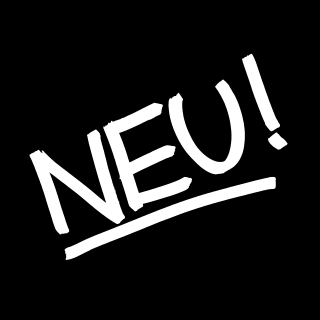
Neu! 75 is the third studio album by the krautrock band Neu!. It was recorded and mixed at Conny Plank's studio between December 1974 and January 1975. It was released in 1975 by Brain Records, and officially reissued on CD on 29 May 2001 by Astralwerks in the US and by Grönland Records in the UK.

Cluster were a German musical duo consisting of Hans-Joachim Roedelius and Dieter Moebius, formed in 1971 and associated with West Germany's krautrock and kosmische music scenes. Born from the earlier Berlin-based group Kluster, they relocated in 1971 into the countryside village of Forst, Lower Saxony, where they built a studio and collaborated with musicians such as Conny Plank, Brian Eno, and Michael Rother; with the latter, they formed the influential side-project Harmonia. After first disbanding in 1981, Cluster reunited several times: from 1989 to 1997, and from 2007 to 2010.

Harmonia was a West German musical "supergroup" formed in 1973 as a collaboration between members of two prominent krautrock bands: Cluster's Hans-Joachim Roedelius and Dieter Moebius joined by Neu! guitarist Michael Rother. Living and recording in the rural village of Forst, the trio released two albums—Musik von Harmonia (1974) and Deluxe (1975)—to limited sales before dissolving in 1976. AllMusic described the group as "one of the most legendary in the entire krautrock/kosmische scene."

Michael Rother is a German experimental musician, best known for being a founding member of the influential bands Neu! and Harmonia, and an early member of the band Kraftwerk.

Hans-Joachim Roedelius is a German electronic musician and composer, known as a co-founder of the influential 'kosmische' groups Cluster and Harmonia. He is notable for his prolific discography, either as a solo artist, as part of a band, or in collaboration with other artists. He has more than 100 releases to his name. He also performed in the ambient jazz trio Aquarello, and released several solo studio albums.

Radio is the first compilation album by the German solo artist Michael Rother. It was released in October 1993.

Musik von Harmonia is the debut album from the influential German krautrock group Harmonia, released in January 1974 by Brain Records. Formed by the addition of Neu! guitarist Michael Rother to Cluster, they recorded the album from June to November 1973 in Cluster's Forst recording studio. It was self-produced by the group using a primitive mixer and three tape recorders.

Deluxe is the second album from the West German krautrock group Harmonia, consisting of Neu! guitarist Michael Rother and the Cluster duo of Hans-Joachim Roedelius and Dieter Moebius. It was recorded in June 1975 in Harmonia's studio in Forst, Germany. It was first released on the Brain Records label in 1975.
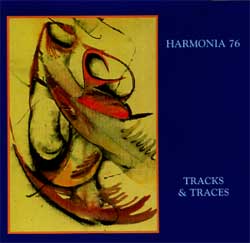
Tracks and Traces is a collaborative album by German kosmische supergroup Harmonia and British musician Brian Eno, initially credited to Harmonia 76. Eno joined the group at Harmonia's studio in Forst, Germany for the September 1976 recording sessions.
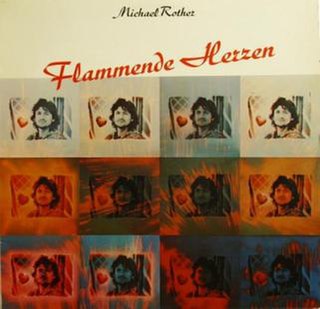
Flammende Herzen is the debut studio album by the German solo artist Michael Rother. It was released in 1977 and includes the single "Flammende Herzen" b/w "Karussell". The music was used the following year to soundtrack Flaming Hearts. It was Rother's first solo venture after having recorded five albums prior as a member of Neu! with Klaus Dinger and Harmonia with Hans-Joachim Roedelius and Dieter Moebius.

Sterntaler is the second studio album by the German solo artist Michael Rother. It was released in 1978 and includes the single "Sterntaler" b/w "Sonnenrad".

Katzenmusik is the third studio album by the German solo artist Michael Rother. It was released in 1979 and includes the single "Katzenmusik 9" b/w "Katzenmusik 2".
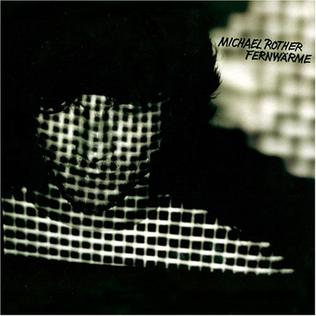
Fernwärme is the fourth studio album by the German solo artist Michael Rother. It was released in 1982 and includes the singles "Silberstreif" b/w "Erlkönig" and "Hohe Luft" b/w "Fortuna".

Lust is the fifth studio album by the German solo artist Michael Rother. It was released in 1983 and includes the single "Palmengarten" b/w "Cascadia".

Süßherz und Tiefenschärfe is the sixth studio album by the German solo artist Michael Rother. It was released in 1985 and includes the singles "Süssherz" b/w "Maus-Mann-Motiv Nr. 4" and "Glitzerglanz" b/w "Rapido".

Traumreisen is the seventh studio album by the German solo artist Michael Rother. It was released in 1987 and includes the single "Lichtermeer" b/w "Happy-End".

Remember (The Great Adventure) is the ninth studio album by the German solo artist Michael Rother. It was released on 25 April 2004. The studio album was Rother's first since 1996 and his sole full release of material in the 2000s. It would take sixteen years till his next album. Dreaming was released in 2020.

Die Engel des Herrn is a 1992 studio album by the band Die Engel des Herrn. It was originally released in a limited edition of 1000 on the private label L.S.D., which Klaus Dinger created when he failed to find a record label willing to release the album. When Dinger signed to Captain Trip Records in 1995 all copies of the album not yet sold were bought up and sold by CTR, although no more copies of the album were ever pressed. Consequently only 1000 copies of the album exist, and it is one of the rarest Klaus Dinger albums.
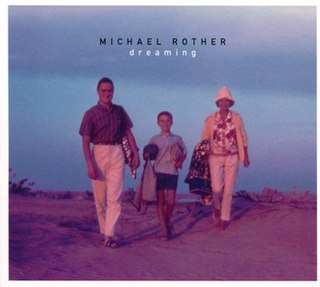
Dreaming is the tenth studio album by the German solo artist Michael Rother. It was released in September 2020. Aside from some soundtrack material during the 2010s, Dreaming is Michael Rother's first solo effort since Remember was released in 2004. The album was constructed from leftover musical sketches and vocal samples of Sophie Joiner from the sessions for Remember .




















